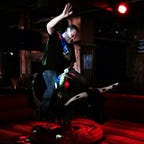The quiet fearlessness of Agnes Obel
When looking for a clue into the musical mind of Agnes Obel, a good starting point would be back in her childhood in Copenhagen, where she first learned the piano from a teacher whose approach was quite unconventional, as she was told that she shouldn’t play anything she didn’t like.
“She was a very good influence in that sense,” Obel recalls. “She never pushed me toward something I didn’t like or told me, ‘Oh, you didn’t practice,’ or was angry with me. So it was very nice.”
No raps on the knuckle with a ruler for a missed note, no endless scale playing, just an insistence on embracing the music and appreciating how it made you feel. So when Obel releases an album like her latest, Citizen of Glass, it’s clear that she took those lessons to heart, and it makes you wonder if she would even be in this business if not for her first music teacher.
“It’s so hard to answer because you don’t know anything different,” Obel said. “People sometimes ask me how my Scandinavian or Danish background is influencing my music, and I feel like it’s almost impossible for me to answer that, and I wish I could because I would love to be able to step out of my own frame of mind and background and be able to see from the outside. But it’s so hard to do that.
“But I think I owe her a lot because she never scared me, she never made me afraid of music,” she continues. “I know a lot of classically trained musicians that went to conservatory and sat for six hours every day rehearsing their instrument, and they have a very solid idea of perfection. And I’m not always sure this is good for creativity. I think it’s important to know that things are never perfect and be relaxed about that. And I think it’s easier to make something on your own because you won’t be so critical. It’s like this little sensitive thing when you start writing a song. And if you have too many critical thoughts or are judging it too early, you can destroy the whole thing. You have to be a little bit in love with it and then you can go with it.”
That doesn’t mean Obel is making music haphazardly or refusing to pay attention to detail. In fact, with Citizen of Glass, Obel has created a magnum opus that consumed her life for over two years. Musically, lyrically and conceptually, this wasn’t something that was put together over a few weeks in the studio. It was so much more than that.
“I got the idea for the album and the title and I started to look for new instruments that sounded glass-like, and started researching literature about transparency and the ideal of transparency,” she said. “So I was trying to feed my mind with different things and then slowly trying to write stuff down and think about what songs I could do. Then I started recording and writing in the beginning of 2015 and I didn’t do anything else. It’s been a very intense process, I have to say the most intense of all the albums I’ve done. But it’s been a very nice challenge to work conceptually and to work with new instruments and, in a way, have the whole thing mirroring my idea and vision of this concept. It felt very meaningful, so I think if I can find something that speaks to me like that, I would do it again.”
With the album now out in the universe, Obel will take her show out on the road, highlighted by a North American tour that begins in Montreal on February 28 and ends in Ann Arbor, Michigan on March 31. If that seems like too long of a wait, there’s more than enough to take in on Citizen of Glass’ ten tracks, which seem to give you something different on each listen. It’s a testament to Obel’s attention to making music that isn’t throwaway Top 40, but something that will stand the test of time.
“I have to do something where my imagination wakes up because then it sort of does the work for me,” she said of her songwriting. “I have to be fascinated and intrigued myself, and then I can work. I feel like life becomes hard when it doesn’t feel meaningful with what you’re doing. And I know that it’s an illusion, but when you work on something where you put a lot of thought and time and personal story into it, then it feels meaningful to you, and then you feel like what you’re doing is important.”
It is, and it’s an attitude not as prevalent as it once was, when albums were something to look forward to and embraced from top to bottom. In that sense, Obel is one of the most fearless artists out there, a compliment she doesn’t necessarily agree with.
“No,” she laughs. “I wish I was. But I think this is what this album is about. I sometimes struggle with telling stories about myself. I want my music to be personal and I want to be honest in my music, but sometimes I’m really afraid of revealing things I’m not supposed to reveal. And it’s not so much about what other people think, it’s more about what I feel afterwards. Did I reveal something that was really special and now it’s not special anymore? So I don’t think I’m fearless, but I look up to these very courageous types who reveal everything. I’m somehow scared by this and I’m thinking maybe it’s not always worth it to reveal everything. It’s sometimes good to keep some stuff.”
For more information on Agnes Obel, including tour dates, click here
